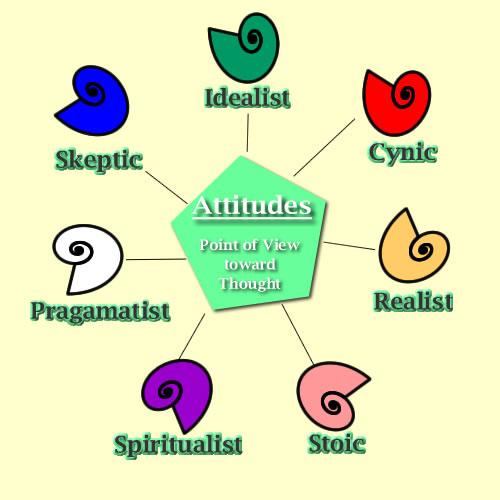Attitudes: a Predisposed Mindset
By Stephen Cocconi © 2017
The Attitude is an intellectual predisposition to filter, contemplate or weigh information whether that is presented from external sources or you perceive or formulate within you. Your Attitude reflects and will bias the internal concepts you hold. Thus, the Attitude affects both your inner and outer world. The Attitude is the “why” that you answer to yourself when you express a particular idea or viewpoint. Ideas you formulate within yourself, will tend to take on the philosophical bent consistent with your Attitude. It is the way you perceive and are perceived by others.

The Attitude provides you with the “why” proposition of your own experience. If we accept the notion that “we can change our mind”, then the Attitude is the most flexible of the Overleaves. Attitude is revealed in the way that you hold your body. A lean, a hunch, a flow or rigidity, or where you cast your eyes offers indications to the attitude. A general good rule of thumb with attitudes in particular if you’re having trouble with them is: Imagine what the person you’re thinking about would be like in a dire emergency. If the shit really hit the fan, what would their perspective be then? That’s generally their real attitude.
On a global level, the Attitude is the Overleaf energy that impacts all of human thought. Indeed, major schools of Philosophy bear some of the same names of this Overleaf category. Although many of these schools of thought actually have smatterings of other Attitudes and Overleaves mixed in, they generally are fairly consistent with the definitions within this system.
The Skeptics such as David Hume and Emmanuel Kant laid down their suspicions of “what is truth” and encouraged vigorous investigation of “what is real”. Hopefully conscious, alteration of a viewpoint. Said a different way, though we don’t rewire our Overleaves to accommodate a new Attitude, this circuit board is the easiest to run the energy of different Attitude into the nature of reality. The outgrowth of this view of Skepticism is Pragmatism. With its view that “reality cannot be objectively known, and therefore you must create it. This view creates the rules and guidelines of humanity lest we degenerate into chaos. The early writers of Vedanta of India, the creators of the Sanskrit language, evolved a thorough and robust methodology to distinguish between the objective and subjective. Thus making this school of thought attuned to the Realist attitude. Buddhism employing several of the same tenants but seeks to be Stoic about the nature of reality as to lose attachment to things and minimize suffering through taming emotional reactiveness.
A word Michael regularly refers is LOGOS. Depending what source you reference it means “the guiding principle of the Universe.” This word is a product of the Greek philosophy of Stoicism which sought to bring meaning to the human condition in order to curtail the problems of being human. They sought tranquility and harmony for all persons through the control of passions. In the Christian tradition, the LOGOS is thought of as “the word of God” or HIS “attitude toward creation”. Thus, the Attitudes is the spiritual kernel (and tautological view – originating from a single reference or source) of the Universe. By extension, your attitude is your LOGOS in your Soloverse. It will reveal itself openly in self-awareness or through ritualized belief systems.
Lastly, the eternal archetypes of the optimist and pessimist as embodied in the Idealist and pessimist are embodied in the Cynic; are more a way of thinking than actual system of thought, each contributes to the clarity of the mind by defining the possibilities and limitations present in a situation. The Idealist sees what things optimally should be done. While for the Cynic the objective is to see why something cannot being done. Both extremes can help expand the realm of potential but do so with a degree of terse evaluation, thus leading to principles and activities which may actually succeed.
